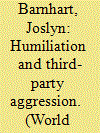|
|
|
Sort Order |
|
|
|
Items / Page
|
|
|
|
|
|
|
| Srl | Item |
| 1 |
ID:
177017


|
|
|
|
|
| Summary/Abstract |
Studies of the effect of past actions have focused on yielding without a fight. What happens, however, when states fight and lose? This article assesses the effect of defeat on a state’s behavior and finds that recently defeated states are more likely to initiate disputes than are undefeated or victorious states or states that fight to a draw. This aggression comes at the expense of states responsible for defeat and third-party states uninvolved in the original defeat. The analysis below examines the validity of five potential explanations for postdefeat aggression, including models rooted in failed political objectives, an emotional desire for revenge and reputation-building and finds evidence in support for the latter two. These existing mechanisms fail, however, to explain a key finding—the systematic targeting of weaker, third-party states—which, I argue, is best explained by a desire to bolster the state’s status and confidence in the aftermath of defeat.
|
|
|
|
|
|
|
|
|
|
|
|
|
|
|
|
| 2 |
ID:
188884


|
|
|
|
|
| Summary/Abstract |
Studies have shown that across time and place, women, on average, are less supportive of the use of force than men. This implies that extensions of the franchise to women provide an opportunity to evaluate theories of democratic constraint on foreign policy decision making. In this article, we theorize democratic constraint on war and peace, arguing that it is a common latent constraint on elite actions and an active constraint when one party is pre-committed to a foreign policy position. We use the extraordinary—yet unexplored—case of the 1916 US presidential election to identify the democratic constraint on foreign policy and of women’s votes in particular. This case represents an early step of women into the electoral realm at the national level and provides unique evidence of leader selection due to changes in public opinion because of the uneven extension of women’s suffrage to US states. Reelected on a platform of: “He kept the United States out of war,” Woodrow Wilson would fail to avoid war in Europe, but he did pursue cooperative policies with Mexico that very likely prevented a second Mexican-American war.
|
|
|
|
|
|
|
|
|
|
|
|
|
|
|
|
| 3 |
ID:
154393


|
|
|
|
|
| Summary/Abstract |
There is a growing consensus that status concerns drive state behavior. Although recent attention has been paid to when states are most likely to act on behalf of status concerns, very little is known about which actions states are most likely to engage in when their status is threatened. This article focuses on the effect of publicly humiliating international events as sources of status threat. Such events call into question a state's image in the eyes of others, thereby increasing the likelihood that the state will engage in reassertions of its status. The article presents a theory of status reassertion that outlines which states will be most likely to respond, as well as when and how they will be most likely to do so. The author argues that because high-status states have the most to lose from repeated humiliation, they will be relatively risk averse when reasserting their status. In contrast to prior work arguing that humiliation drives a need for revenge, the author demonstrates that great powers only rarely engage in direct revenge. Rather, they pursue the less risky option of projecting power abroad against weaker states to convey their intentions of remaining a great power. The validity of this theory is tested using an expanded and recoded data set of territorial change from 1816 to 2000. Great powers that have experienced a humiliating, involuntary territorial loss are more likely to attempt aggressive territorial gains in the future and, in particular, against third-party states.
|
|
|
|
|
|
|
|
|
|
|
|
|
|
|
|
| 4 |
ID:
147907


|
|
|
|
|
| Summary/Abstract |
When are states willing to engage in behaviors of little material or strategic value in order to assert their status? This article demonstrates that states are more likely to engage in acts of status assertion if their international standing has been called into question. Such status-challenged states seek opportunities to demonstrate their capabilities as well as their intention to maintain their current status. Status assertions often challenge the status and security of other states, leading these states to engage in more frequent acts of aggression. Evidence for these claims comes from detailed analysis of the Scramble for Africa at the end of the nineteenth century. France and Germany adopted expansionary policies in Africa because their great power status had been called into question. These policy shifts directly led Italy and Britain to adopt expansionary policies, leading to the eventual conquest of 95 percent of the African continent.
|
|
|
|
|
|
|
|
|
|
|
|
|
|
|
|
|
|
|
|
|